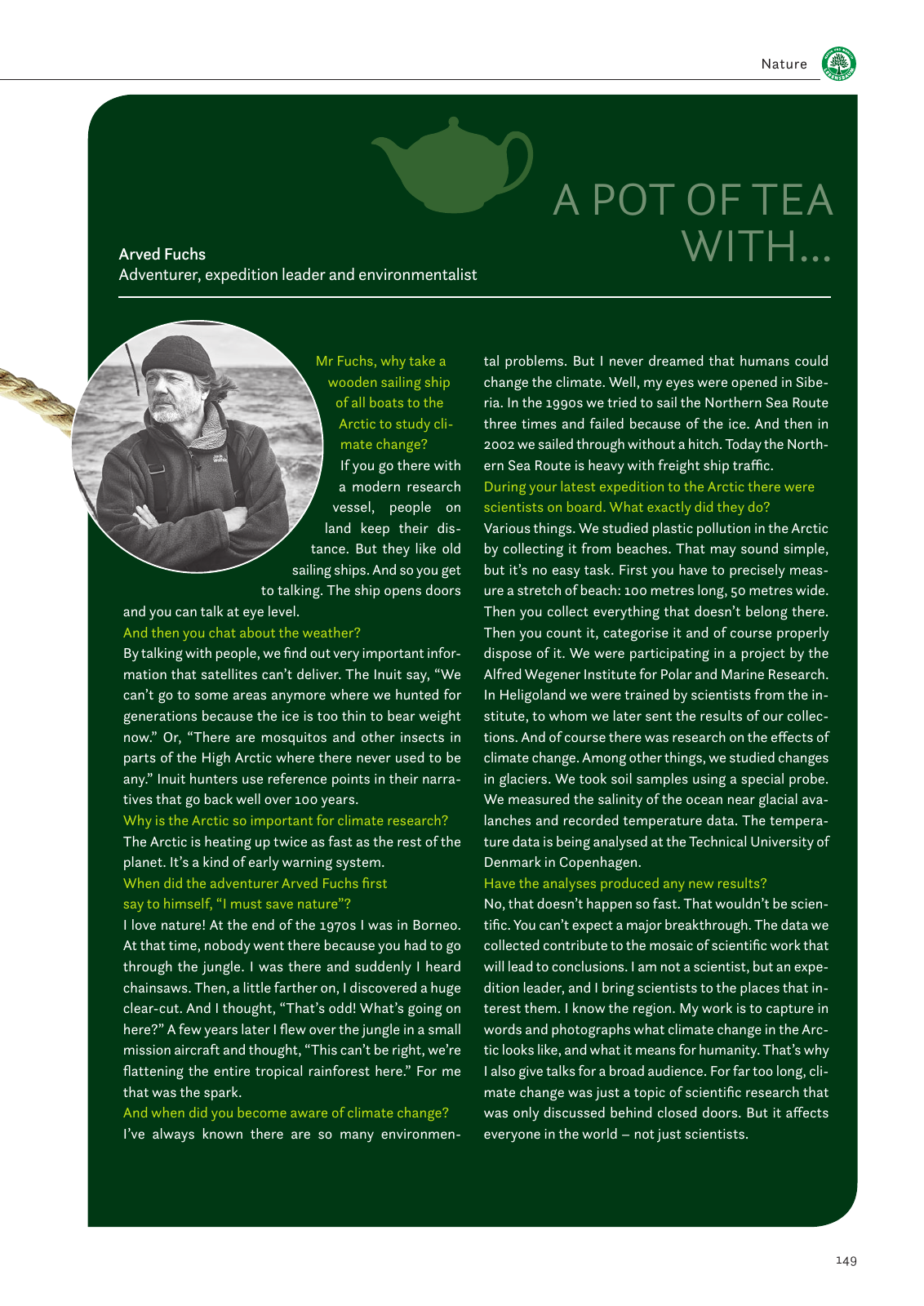149 Nature Mr Fuchs why take a wooden sailing ship of all boats to the Arctic to study cli mate change If you go there with a modern research vessel people on land keep their dis tance But they like old sailing ships And so you get to talking The ship opens doors and you can talk at eye level And then you chat about the weather By talking with people we find out very important infor mation that satellites can t deliver The Inuit say We can t go to some areas anymore where we hunted for generations because the ice is too thin to bear weight now Or There are mosquitos and other insects in parts of the High Arctic where there never used to be any Inuit hunters use reference points in their narra tives that go back well over 100 years Why is the Arctic so important for climate research The Arctic is heating up twice as fast as the rest of the planet It s a kind of early warning system When did the adventurer Arved Fuchs first say to himself I must save Nature I love Nature At the end of the 1970s I was in Borneo At that time nobody went there because you had to go through the jungle I was there and suddenly I heard chainsaws Then a little farther on I discovered a huge clear cut And I thought That s odd What s going on here A few years later I flew over the jungle in a small mission aircraft and thought This can t be right we re flattening the entire tropical rainforest here For me that was the spark And when did you become aware of climate change I ve always known there are so many environmen tal problems But I never dreamed that humans could change the climate Well my eyes were opened in Sibe ria In the 1990s we tried to sail the Northern Sea Route three times and failed because of the ice And then in 2002 we sailed through without a hitch Today the North ern Sea Route is heavy with freight ship traffic During your latest expedition to the Arctic there were scientists on board What exactly did they do Various things We studied plastic pollution in the Arctic by collecting it from beaches That may sound simple but it s no easy task First you have to precisely meas ure a stretch of beach 100 metres long 50 metres wide Then you collect everything that doesn t belong there Then you count it categorise it and of course properly dispose of it We were participating in a project by the Alfred Wegener Institute for Polar and Marine Research In Heligoland we were trained by scientists from the in stitute to whom we later sent the results of our collec tions And of course there was research on the effects of climate change Among other things we studied changes in glaciers We took soil samples using a special probe We measured the salinity of the ocean near glacial ava lanches and recorded temperature data The tempera ture data is being analysed at the Technical University of Denmark in Copenhagen Have the analyses produced any new results No that doesn t happen so fast That wouldn t be scien tific You can t expect a major breakthrough The data we collected contribute to the mosaic of scientific work that will lead to conclusions I am not a scientist but an expe dition leader and I bring scientists to the places that in terest them I know the region My work is to capture in words and photographs what climate change in the Arc tic looks like and what it means for humanity That s why I also give talks for a broad audience For far too long cli mate change was just a topic of scientific research that was only discussed behind closed doors But it affects everyone in the world not just scientists Arved Fuchs Adventurer expedition leader and environmentalist A POT OF TEA WITH

Hinweis: Dies ist eine maschinenlesbare No-Flash Ansicht.
Klicken Sie hier um zur Online-Version zu gelangen.
Klicken Sie hier um zur Online-Version zu gelangen.